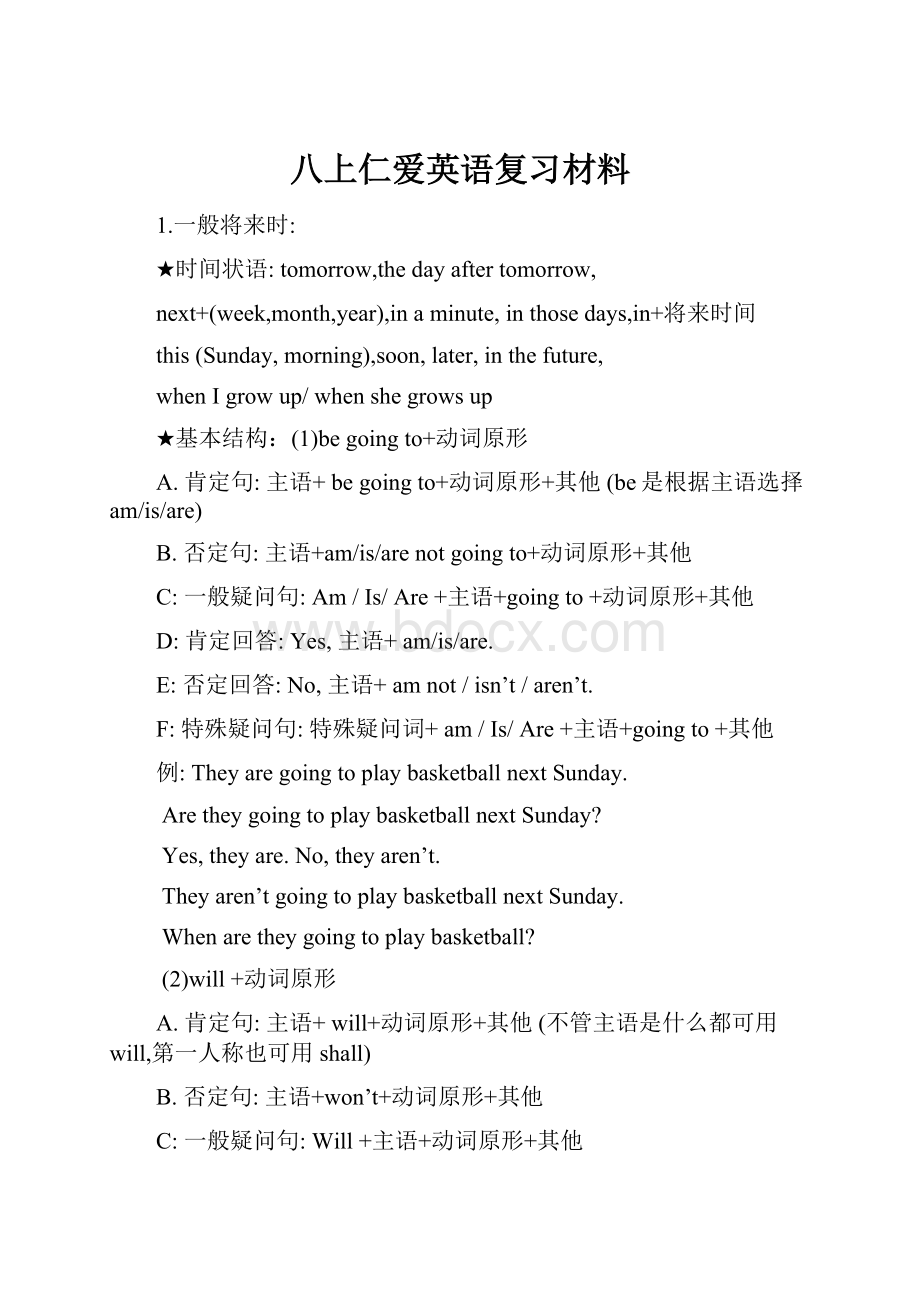八上仁爱英语复习材料.docx
《八上仁爱英语复习材料.docx》由会员分享,可在线阅读,更多相关《八上仁爱英语复习材料.docx(32页珍藏版)》请在冰豆网上搜索。

八上仁爱英语复习材料
1.一般将来时:
★时间状语:
tomorrow,thedayaftertomorrow,
next+(week,month,year),inaminute,inthosedays,in+将来时间
this(Sunday,morning),soon,later,inthefuture,
whenIgrowup/whenshegrowsup
★基本结构:
(1)begoingto+动词原形
A.肯定句:
主语+begoingto+动词原形+其他(be是根据主语选择am/is/are)
B.否定句:
主语+am/is/arenotgoingto+动词原形+其他
C:
一般疑问句:
Am/Is/Are+主语+goingto+动词原形+其他
D:
肯定回答:
Yes,主语+am/is/are.
E:
否定回答:
No,主语+amnot/isn’t/aren’t.
F:
特殊疑问句:
特殊疑问词+am/Is/Are+主语+goingto+其他
例:
TheyaregoingtoplaybasketballnextSunday.
AretheygoingtoplaybasketballnextSunday?
Yes,theyare.No,theyaren’t.
Theyaren’tgoingtoplaybasketballnextSunday.
Whenaretheygoingtoplaybasketball?
(2)will+动词原形
A.肯定句:
主语+will+动词原形+其他(不管主语是什么都可用will,第一人称也可用shall)
B.否定句:
主语+won’t+动词原形+其他
C:
一般疑问句:
Will+主语+动词原形+其他
D:
肯定回答:
Yes,主语+will.
E:
否定回答:
No,主语+won’t.
F:
特殊疑问句:
特殊疑问词+will+主语+其他
例:
Wewilltakepartinthesportsmeetnexttime.
Willyoutakepartinthesportsmeetnexttime?
Yes,wewill.No,wewon’t.
Wewon’ttakepartinthesportsmeetnexttime.
Whatwillyoutakepartinnexttime?
(3)come,go,leave,fly等词可以用现在进行时表示一般将来时。
HeisleavingforShanghaitomorrow.
==HeisgoingtoleaveforShanghaitomorrow.
2.Therebe句型的一般将来时:
(1)Thereis/aregoingtobe(常跟名词单数,故也常用Thereisgoingtobe)……
A.一般疑问句:
Istheregoingtobe…….?
B.肯定回答:
Yes,thereis.
C.否定回答:
No,thereisn’t.
D.否定句:
Thereisn’tgoingtobe……..
(2)Therewillbe…….(可以跟名词复数/单数)
A.一般疑问句:
Willtherebe…….?
B.肯定回答:
Yes,therewill.
C.否定回答:
No,therewon’t.
D.否定句:
Therewon’t/willnotbe……..
2.seesbdosth
3.cheersbon(sb要用宾格)
4.oneof+名词的复数(但谓语必须用单数)
Heisoneofthebestrunnersintheworld.
5.giveupdoingsth
6.womanplayer-------womenplayers
7.go+ving----动名词
8.prefer/enjoy/like/love/pracice+ving
9.sb+spend(s)/spent+金钱+onsth某人花费时间在某事上
sb+spend(s)/spent+时间/金钱+(in)doingsth某人花费时间/金钱在做某事上
sth(物)+cost(s)+sb+金钱某物花费某人多少钱
It+take(s)/tooksb+时间+todosth做某事花费某人多少时间
例如:
Mariaspendsalotofmoneyonherclothes.
==Mariaspendsalotofmoneyinbuyinghisclothes.
==ClothescostMariaalotofmoney.
Ittakesmehalfanhourtodomyhomework.
10.Howlong/Howoften
Howlong:
提问时间段
Howoften:
提问频率副词
11.Therebe的将来时:
在there和be动词之间加上begoingto/will
Thereisgoingtobeasportsmeetnextweekend.
Therewillbeasportsmeetnextweekend.
Therearegoingtobetwonewstudentsinourclassthisterm.
12.besurethat…+句子
13.make/keep+sb/sth+形容词
14.excited----人作主语(某人感到激动)
exciting----物作主语(某物使人激动)
WeareexcitedtoseeBeckham.
Thestoryisexciting.
U1T2
1.Wouldyoumind你介意….吗?
(1)结构:
Wouldyouminddoingsth……“做….好吗?
否定形式:
Wouldyoumindnotdoingsth?
Wouldyoumindclosingthedoor?
Wouldyoumindnotputtingthebikehere?
(2)句中动名词前可以叫一个逻辑主语,一般用形容词性物主代词.
Wouldyoumindmysmokinghere?
你介意我在这抽支烟吗?
(3)后接if引导的从句,
WouldyoumindifItryitagain?
(4)回答方式:
A听从对方提议,表示一点也不介意的,如:
Notatall./Ofcoursenot./Certainlynot./Nevermind.
B:
拒绝对方提议,表示介意,“对不起…./恐怕你别….”
I’msorry…../I’mafraidyou’dbetternot.
(5)同义句:
Couldyouplease+动词原形
WouldyoumindteachingmeEnglish?
==CouldyoupleaseteachmeEnglish?
你帮我学习英语吗?
2.学习回答别人道歉的用语:
Nevermind.别在意义。
Itdoesn’tmatter.没关系。
That’sOk..没事。
It‘snothing.没什么。
That’sallright.不要紧。
3.Ihaveanotherone.another:
三个或三个以上的“另一个”+单数名词
other:
另一个。
+单数名词/复数名词
theother:
one….theother
others:
另外的人或物。
=====名词
Idon’tlikethisdress.Pleaseshowmeanotherone.(商店里有很多裙子,除了那件外,)
WelearnEnglish,Chinese,mathandothersubjects.
Ihavetwobrothers.OneisJim,theotherisTom.(我就两个哥哥)
Therearemanystudentsontheplayground.Someareplayingfootball,othersarewatchingthem.
4.too用于肯定句,放在句末
also用于肯定句,放在句中,放在be动词后,动词前
either用于否定句,放在句末
aswell用于肯定句,放在句中====too
5.
exciting物作主语tiringinteresting
excited人作主语tiredinterested
6.mind/enjoy/like/love/practice/keep/start+动词ing
7.疑问代词+todosth
Idon’tknowwhattodo.
Couldyoupleasetellmehowtogettothebusstation.
9.moreandmore越来越。
。
。
。
。
10.系动词+形容词
gethungrysoundwonderfulturngreenlookhappy
U1T3
3.bein/takepartin/joinin+活动------------参加某活动
4.Maybe=perhaps可以放在句首,句中。
如果maybe后引导的句子中的谓语动词是be动词,则可以用maybe进行同义句转换。
Maybe/Perhapsheisastudent.======Hemaybeastudent.
5.约会的对话:
---Whenshallwemeet?
----Let’smakeithalfpastsix.
---Whereshallwemeet?
---Atmyhouse.
---WhataboutthisSunday?
----Goodideas.
6.地点名词:
attheschoolgateathomeatthehouseatthetheateratthetrainstation
onthefarm
7.英语日记的写作。
一般在左上角记当天日期,包括星期和几月几日;右上角写天气,一般用形容词。
如fine,sunny,cloudy,windy,snowy,rainy等。
日记中所用的时态通常是发生在过去,故基本上是用过去式。
8.can/beableto-------------“能够,有能力。
can:
只用于一般现在时(can+动词原形)和一般过去式(could+动词原形)
beableto:
可以有各种时态。
am/is/areableto;was/wereableto;willbeableto
9.dowellin(well是副词,用于修饰动词“do”)-------反义词dobadlyin
Tomdoeswellinbasketball.=====(否定句)Tomdoesbadlyinbasketball.
10.书本P6
(1)Iwill/shall/amgoingtoplaysoccertomorrowmorning,becauseplayingsoccermakesmestrongandit’spopularallovertheworld.
(2)Hewill/isgoingtorunthisafternoon,becauserunningisgoodforhislegs,heartandlungsandmostpeoplelikeit.
(3)Shewill/isgoingtoswimthedayaftertomorrow,becauseswimminghelpstokeepherheartandlungshealthyandit’sagoodwaytokeepfit.
(4)Theywill/aregoingtowalkaftersupperbecausewalkinghelpsthemtorelaxandit’agoodwaytokeephealthy.
U2T1
1.身体某个部位+ache,表身体某处疼痛。
如:
headache头痛 backache 背痛 stomachache 胃痛 toothache 牙痛
2.medicine “药”为不可数名词pill “药片”为可数名词
如:
takesomemedicine 吃些药 takesomecoldpills 吃些感冒药
3.ill与sick都表示“生病的”,只能作表语而既可作表语也可作定语.
如:
Themanisill/sick.那个男人病了.(作表语)
Heisasickman.他是个病人.(作定语)
4.with “含有…” without “没有”
hotteawithhoney 加蜜的茶 coffeewithsugarandmilk 加糖和牛奶
mooncakewitheggs含鸡蛋的月饼
Chineseteawithnothing=Chineseteawithoutanything中国清茶
Gotoschoolwithout(eating)breakfast.没吃早饭去上学。
5.until “直到……为止”;句中动词一般为延续性动词
not…until…. “直到……才…”;句中动词一般为短暂性动词
如:
Hewillwaitforhisfatheruntilteno’clock.他将等他父亲一直到10点为止.
Hewon’tleaveuntilhisfathercomes. 直到他父亲来他才离开.
6.both…and…. “……和……(两者)都”;当主语时,谓语动词用复数.
如:
IknowbothJimandTom. 吉姆和汤姆俩人我都认识.
BothJimandIare16yearsold. 我和吉姆都是16岁.
7.plentyof…“充足;大量” 既可修饰可数名词也可修饰不可数名词,只用于肯定句,
相当于alotof…/lotsof…
many “许多”,修饰可数名词
much “许多”,修饰不可数名词
如:
Youshoulddrinkplentyof/alotofboiledwater. 你应该喝大量的开水.
Youshouldn’tdrinksomuchwater.你不应该喝这么多水.
Ihavemany/lotsof/alotof/plentyofbooks.我有许多水.
8.toomuch+不可数名词toomany+可数名词复数
Youshouldn’teattoomuchcandy.
Therearetoomanypeopleinthepark.
如果要修饰动词,则必须要用toomuch
Youhadbetternotmoveyoulegtoomuch.(修饰move动词)
9asksbtodosth---------asksbnottodosth
tellsbtodosth--------tellsbnottodosth
10.ontheInternet/radio/phone
onTV
11.不定代词something,anything,nothing,everything等词修饰形容词,必须放在形容词前面Ihavesomethinginterestingtotellyou.我有些有趣的事情要告诉你。
Isthereanythingnewonthenewspaper.报纸上有新的东西吗?
TheX-raysshowit’snothingserious.X光片显示没有什么严重的。
四、交际用语
(一)询问病情
What’swrong/thematter/thetroublewithyou?
有什么不舒服?
Howareyoufeelingnow?
你现在感觉怎么样?
Doyouhaveacold?
你得了感冒了吗?
(二)诉说病情
1. Ifeelterrible./Iamfeelingterrible.我感到难受.
2. Ihaveaheadache/stomachache/….我头痛/肚子痛…..
3. Ican’tsleepwellatnight. 我晚上睡不4. 好觉.
5. Icoughdayandnight.我日日夜夜地咳嗽.
6. ButmyleftleghurtswhenImoveit.但是当我移动时,我的左腿疼.
(三) 表示同情
1. I’msorrytohearthat.听到这事我感到难过.
2. That’stoobad.那太糟了.
四) 表达建议
1. You’dbetter(not)dosth 最好(不2. )做某事.
3. Youshould/shouldn’tdosth 你(不4. )应该做某事.
5. ShallItakeyoutothehospital?
我带你去医院好吗?
U2T2
Isee.Stayinguplateisbadforyourhealth.我明白了.熬夜有害你的健康.
(动名词短语做主语)
Isgoingtobedearlygoodorbadforyourhealth?
It’sgood.
早点睡觉对你的健康有益还是有害?
有益.(选择问句要根据事实回答)
Don’twalkonthelawn.不要践踏草坪.
Walkingisgoodexerciseanditisnecessaryforgoodhealth.散步是很好的锻炼,是身体健康必不可少.
Itwillkeepyouactiveinthedaytime.它(早睡早起)将使你在白天保持旺盛的精力.
Youmustnotthrowlitterabout.=Don’tthrowlitterabout.不要乱扔垃圾.
Youmaygetaheadachewhenyoucan’tgetenoughsleep.当你睡眠不足时,可能会头疼.
Theboybecomessick. 那个男孩生病了.
Asweknow,goodhealthismoreimportantthanwealth.众所周知,健康比财富更重要.
Ifweeattoolittleortoomuchfood,orifwechoosethewrongfood,itcanmakeussick.
如果我们吃得太少或太多,或者食物的选择不当会生病的.
It’snecessaryforustohavehealthyeatinghabits.对我们来说,养成健康的饮食习惯是必要的.
三.重点语言点
1. begoodfor… 对……有益
bebadfor… 对……有害
如:
Swimmingisgoodforhealth. 游泳对健康有益.
Readinginthesunisbadfortheeyes. 在强烈的阳光下看书对眼睛有害.
2.disease 通常指具体的病,表“特定的疾病、病名”
illness 通常指生病的状态或表抽象的疾病
如:
Germscancausediseases. 细菌会引发疾病。
SARSisaseriousdisease. 非典是一种严重的疾病。
Don’tworryabouthisillness. 别担心他的病。
3.exercise 表“锻炼/运动”时,为不可数名词;
表“练习”或有定语修饰时,为可数名词.
如:
Heoftentakes/doesexerciseinthemorning.他经常上午锻炼.
Pleasedotheexercisesatonce.请马上做这些练习.
Hedoesmorningexerciseseveryday.他每天做早操
. Walkingisgoodexercise.散步是很好的锻炼.
4.enough adj.“足够的”
(1)修饰名词时,既可放在名词之前,也可放在名词之后.(但通常放在名词之前)
如:
Ihaveenoughtime/timeenoughtofinishthiswork.我有足够的时间完成这项工作.
Thereisenoughfoodinthefridge.冰箱里有足够的食物.
(2)adv.“足够地” 修饰形容词或副词时,均放在所修饰词的后面.
如:
Heistallenoughtoreachtheapple.他足够高,能够得着苹果.
Hespeaksclearlyeno